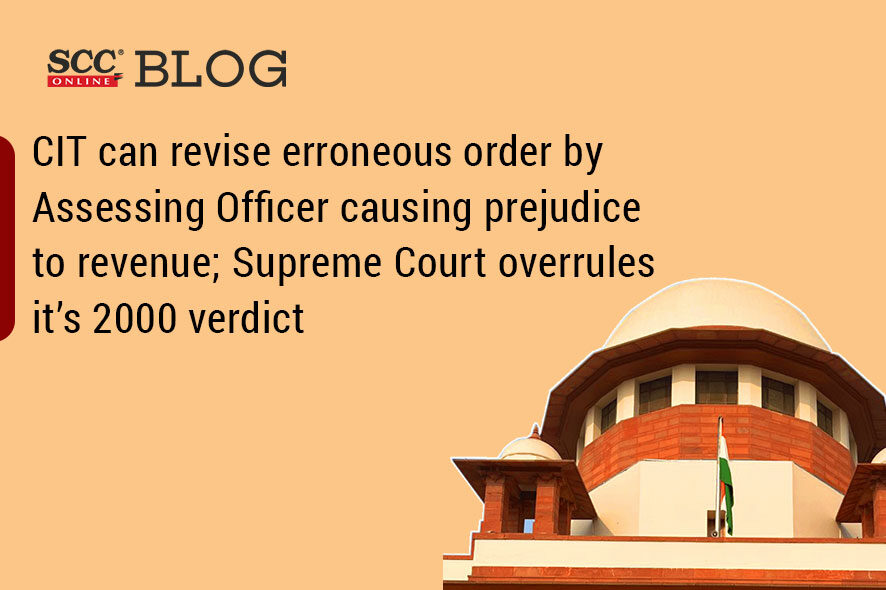Supreme Court: The Commissioner of Income Tax challenged the order passed by the Bombay High Court wherein the appeal filed by the Revenue Department was dismissed, confirming the order passed by Income Tax Appellate Tribunal (‘ITAT’) which set aside the order passed by the Commissioner passed under Section 263 of the Income Tax Act, 1961 (‘Income Tax Act’). While exercising its Civil Appellate Jurisdiction, the division bench of M.R. Shah* and A.S. Bopanna J.J., while setting aside the order passed by the Bombay High Court, held that Commissioner of the Income Tax can exercise revision powers under Section 263 of the Income Tax Act over the orders of the Assessing Officer which cause prejudice to the interest of the revenue.
In the matter at hand, Paville Projects Private Limited was engaged in the manufacture and export of garments, shoes etc. It filed its income tax return for the AY 2007-08 wherein it showed sale of the property for an amount of INR 33 crores. There existed litigation between shareholders of the Company which culminated in an amicable settlement during arbitration proceedings. The subject property was sold to discharge encumbrances from the sale proceeds to pay off the shareholders therefore, it was alleged to be ‘cost of improvement’. Capital gain tax was paid on the balance amount and the assessment was completed in December 2019 under section 143(3) of the Income Tax Act.
Legal Trajectory
However, a notice dated 24-10-2011 was issued by the Commissioner of Income Tax under Section 263 of the Income Tax Act to show cause as to why the assessment order should not be set aside. The Commissioner vide its order dated 24.11.2011 held that the assessment order passed under Section 143(3) of the Income Tax Act was erroneous and prejudicial to the interest of the revenue on the issue relating to deduction of INR 31.05 crores claimed by the assessee as ‘cost of improvement’ while computing long term capital gains. The claim of the assessee that the said payment was made by them towards settlement of litigation, which according to the assessee amounted to discharge of encumbrances and required to be considered as ‘cost of improvement’, was not accepted by the Commissioner as according to him it did not fall under the definition of ‘cost of improvement’ contained in Section 55(1)(b) of the Income Tax Act. According to the Commissioner, the expenses claimed by the assessee neither constituted expenditure that is capital in nature nor resulted in any additions or alterations that provide an enhanced value of an enduring nature to the capital asset. The Commissioner also held that the payment as contended, was not made by the assessee to remove encumbrances and that the provisions of sections 50-A and 55(1)(b) of the Income Tax Act was not complied with thus, the assessment order was erroneous and prejudicial to the interest of the revenue. Consequently, the Commissioner set aside the assessment order passed by the Assessment Officer with a direction to recompute the capital gains of the assessee in consonance with the provisions of the Act.
The assessee approached the Income Tax Appellate Tribunal (‘ITAT’) against the order passed by the Commissioner, under Section 263 of the Income Tax Act which had held that the Commissioner wrongly invoked the jurisdiction under Section 263 of the Act and further observed that there was no error on facts declared. It was held that every loss of revenue as a consequence of Assessment Officer’s order cannot be treated as prejudicial to the interest of the revenue. It also upheld the allowability of the assessee’s claim of deduction of payment made to the shareholders.
The Department’s appeal against the ITAT’s order had been dismissed by the High Court by the impugned judgment and order wherein the High Court has confirmed the ITAT’s findings that the claim for deduction of INR 31.05 crores was for ending the litigation and the payment was made as per the direction of the Company Law Board as well as the interim arbitral award.
Court Analysis
The Bench stated that the scheme of the Income Tax was to levy and collect tax in accordance with the provisions of the Act which was entrusted to the Revenue. If due to an erroneous order of the Income Tax Officer, the Revenue was losing tax lawfully payable by a person, it will certainly be prejudicial to the interests of the Revenue.
The Court upon perusing the Assessment Order and the order passed by the Commissioner of Income Tax, relied upon Malabar Industries Company Limited v. CIT, (2000) 2 SCC 718 and held that the order passed by the Assessing Officer was erroneous as well as prejudicial to the interest of the Revenue. Thus, the High Court had committed a very serious error in setting aside the order passed by the Commissioner passed in exercise of powers under Section 263 of the Income Tax Act.
With the above observation, the Bench allowed the appeal and set aside the impugned order passed by the High Court and restored the order passed by the Commissioner in exercise of powers under Section 263 of the Income Tax Act.
[Commissioner of Income Tax v Paville Projects Private Limited, 2023 SCC OnLine SC 371, decided on 06-04-2023]
Judgment authored by Justice M.R. Shah
Advocates who appeared in this case:
For the Appellants- Additional Solicitor General Balbir Singh, Advocate Chinmayee Chandra, Advocate Shyam Gopal, Advocate Manish, Advocate Piyush Beriwal, Advocate Shyam, Advocate on Record Raj Bahadur Yadav;
For the respondents- Senior Advocate Firoz Andhyarujina, Advocate Maneck Andhyarujina, Advocate on Record Rajesh Kumar, Advocate Rahul Krishna, Advocate Siddharth Singh.







